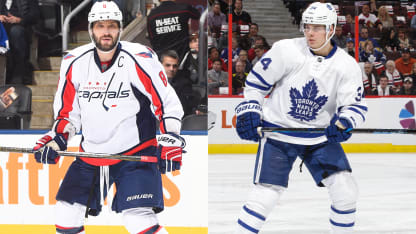Matthews averages 15:00 minutes per game at even strength, first among Toronto forwards, and second among rookie forwards to Laine (15:21). Matthews centers the top line with Zach Hyman on one wing and either William Nylander or Connor Brown on the other, all rookies. Matthews has lined up for 171 faceoffs in the offensive zone and 117 in the defensive zone, for a Maple Leafs-high zone-start percentage of .594.
Zone-start information is not available for 2005-06, but Ovechkin was used in a comparable fashion in his rookie season. He led Washington forwards with an average of 14:05 per game at even strength, which ranked first among NHL rookie forwards. He played with Chris Clark and Dainius Zubrus, who had previous single-season NHL highs of 25 points and 43 points.
Ovechkin had the advantage of more time on the power play; at 6:43 minutes per game, he scored 21 of his 52 goals. That target is out of reach for Matthews, who averages 2:48 per game on the power play.
If special-teams scoring is set aside, Matthews is on pace for a stronger season than Ovechkin and the finest rookie season since Selanne.
With 17 even-strength goals in 37 games, Matthews was tied with Pittsburgh Penguins forward Sidney Crosby for the NHL lead and was on pace to score 37 in 82 games. If Matthews succeeds, he will outscore Ovechkin (28) and every NHL rookie since Selanne set the record with 52 even-strength goals in 1992-93.


















